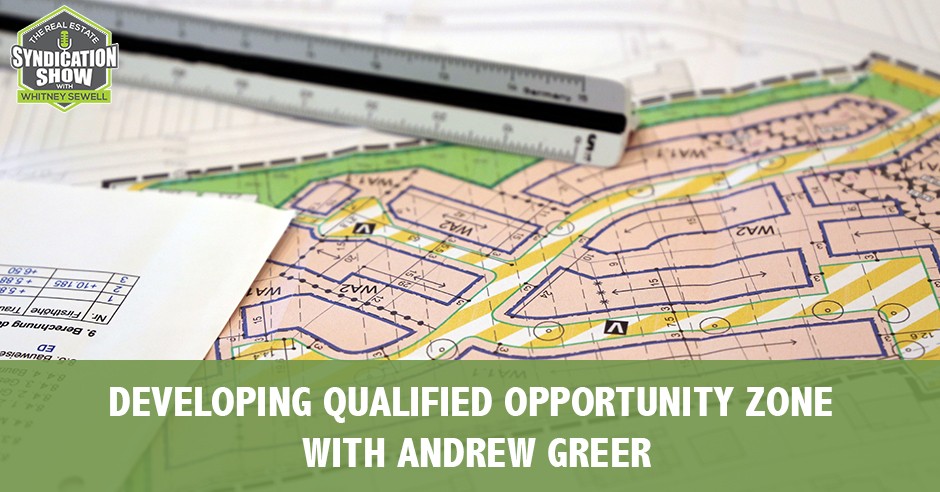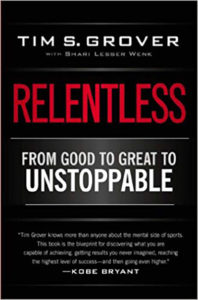
Listen to the podcast here:
Did you know that you have 31 months to increase the bases of the property by 100% to be a Qualified Opportunity Zone? Real estate developer Andrew Greer explains why this is the best thing that has hit the real estate industry and shares some tips on how to acquire assets that are cashflow-generating efficiently. He goes in-depth on how they specialize in permitting and zoning to have a competitive edge in the market. Andrew outsources a specific task that has made his life much easier and he tells us how.
Our Gracious Sponsor:
Are you wanting to learn how to gain financial freedom through having your own syndication business? Text LEARN to 474747 to begin to learn from one of the best in the industry, Vinney Chopra. Vinney came to the US with only $7 in his pocket, and now controls hundreds of millions of dollars of real estate he has acquired through multifamily syndication. He is now personally coaching others to do the same. Text LEARN to 474747 to begin your journey to starting your own syndication business! Vinneychopra.com
—
Watch the episode here:
Developing Qualified Opportunity Zones with Andrew Greer
Our guest is Andrew Greer. Thanks for being on the show, Andrew.
Thanks for having me on.
Andrew started his real estate career as a short-term flip investor. He’s focused now on cost-effective build and development. He’s a real estate developer that manages investments from the cradle to the grave for his investors. Andrew, give us a little more about what you’re doing now, what your focus is in this business, and then we’re going to jump into some of your specialties.
My specialty that we’re focused on and have been for the past few years is the development of the property. It’s taking existing property or vacant lands and building either multifamily apartment complexes or building up subdivisions, single-family homes. In particular, we’re focused on multifamily and developments for qualified Opportunity Zones. That’s a big portion of our focus.
Could you tell us about a deal you’re working on or that we could dive in a little bit to understand a little more about how you all do what you do?
I can give you a fun deal that got a lot more fun on us a few months in. We acquired two duplexes next to each other and the intention was to rent out short-term, one of two of the units, and then take the other property and syndicate it to build an eight-unit apartment complex right there.
You could take down one duplex and build an eight-unit.
San Diego has a lot of code changes and density changes that we stay on top of. It’s one of my favorite things to stay on top of research, be part of. I’m active in that community as far as what’s going on. I’ll go speak at the city council any time they’re voting on it to push for higher density in any of these areas. We had that one and we were going to build eight units. All of a sudden, our neighbor who we’ve been pestering for a couple of years because we were trying to lock up the deal for quite a while, decided that he was ready to sell. At the same time, we had a vote going on at the city to increase the density even further. We got that property into escrow, just close. Instead of having ten units total, eight plus two, we’re going to be building 26. It became a much bigger deal. It’s an interesting approach that my partner and I have taken to several deals.
We’ll go in and acquire the asset upfront and create the performance of the asset. I’ve turned these into Airbnbs and they’re cashflow-generating money and we’re putting together the offering on it. We’re going to go syndicate out to do the demolition, construction and build out the actual project. We’ll try and create a little value out upfront for the investors coming in so we can capitalize on our money further. We’ll then syndicate it out, we’ll maintain an equity role as well in the project, then also be the asset manager and then be in charge of property management if we choose to. We haven’t chosen to yet, but we think we might eventually.
Let’s back up a little bit. When you all first acquired this property, were you all planning then to take down one duplex to build an eight-unit or you already had that in the works?
That was the plan when we picked it up. We always test the market when we do a strategy like this. We’ll talk about and see if anyone will buy it from us immediately with our concept. No one bid on it, so we went back and started the actual process and definitely got the phone call that they wanted to sell next door.

When you all acquired the property, did you put it right back out in the market or try to sell it to other buyers?
Usually within a couple of months, we’ll do a test. We’ll put together our feasibility study on it. Soils, conceptual plans, what prelim documents we can do at the city to see what can be improved. If it’s rich and it looks good, we’ll move it right there and move that money towards another project. We’ve had three that we’ve only owned for less than 30 days and we’ve been able to turn a profit on them that quick because we did the feasibility, put everything together and sell them out to another developer.
The city was taking a vote. What were they voting on exactly?
This was a 100% density bonus that they were doing in the city. Overall, we’d be able to build thirteen units is what it came out to if we assembled the lot. A 100% density bonus means that if we allocate 10% of our inventory of units as affordable, they will allow us to increase it from 13 to 26, so a 100% increase in density. They also allowed us to remove parking spots that we didn’t want. They allowed us to do a few different other things as well that make it beneficial. We only capitalize on the 100% density bonus and then a few other technical things in the way we want to design our driveway. That goes into the permitting side. We had a specific driveway, the kind we wanted. It sounds weird, but it saves us $150,000 in construction to do it the way we want.
It sounds like a good driveway for me to save that money. I haven’t heard anybody talk about the 100% density bonus before. They voted and they approved it. What was your involvement in that? How much involvement can you have? Were you able to help that vote one way or the other, persuade, or show the evidence of what could be done?
They put it out to the community and they have multiple meetings leading into the actual vote. Ask for and against speakers. You show up at the event and you speak at them. Basically, you have one minute. You can get allotted up to two minutes if someone else invested their time for you. You go up and speak, you go to the workshops and get involved as much as you can with the actual community action to make it happen. We tied into a few different groups that are focused on affordable housing, mobility and higher density. That got us all together so we can show up 100 plus of us at the event to be strong and push it forward. Overall, there are probably 200 plus people from other groups too.
Preparing for something like that, if you’re going to speak at that moment, you better be ready. How did you prepare? How did you know what you needed to be prepared to speak on?
I pulled the basic talking points that we all discussed together in our groups. There’s ULI, Urban Land Institute, they’re all over. I’m not a member, which was funny but all my friends are, so I can’t get the benefit. They put together some points on what developers should talk about like affordability rates, parking rates, the amount of open land that can be captured by doing this and the overall affordability in San Diego. We all highlighted those points essentially over and over again. A big complaint against it was that developers were going to build buildings that no one wants to live in. We pushed to the point that if we’re willing to risk all of our own money to do that, shouldn’t you let us? It came across we’re not going to build stuff people can’t live in. We’re going to go higher density doesn’t mean we’re always going to do it. It depends on what the market wants. It gives us more ability to work with the market.
Was it your plan to syndicate this though before this happened?
We planned on holding the duplex ourselves and then syndicating out the eight-unit. To get the construction done, we like to syndicate out our projects because we have an eight-unit, a ten-unit, three custom homes, the 26-unit and then another fifteen-unit all in the works. My partner and I’s capital can’t cover all of that. A few years ago, we had a bunch of projects we bought. We realized, “We need to figure out how to syndicate all of these so we can hold onto them and build them and not give up too much equity or not have a debt burden of over $100,000 a month on top.” That’s how we got into it. We’ve been doing it over and over again since then.
Are you syndicating individual deals? Are you doing a fund and doing numerous deals in one fund?
[bctt tweet=”Always test the market before buying or selling a property. ” via=”no”]
We’re doing all of them in individual prospects. We’re in the works of doing a fund or the qualified opportunities on stuff. There are some limitations with it that the attorney we’re working with is trying to coordinate because of timing, money and releasing of assets, etc.
You specialize in the permits section and knowing some of that, I’d love for you to dive in a little bit about what you had to do for the permits and anything else that we should know about that project.
There are two big things to think of when you go into development. The first one, is it a ministerial action? Is this something that you’re essentially going to the city and saying, “I’m putting this beam here and this beam here and attach them with this T sphere?” They’re going to say, “That’s good.” Is it discretionary where you’re saying, “I’d like to build an eight-unit over here. The code says I can build a six-unit. Can we discuss that?” Say you’re getting a concept approved, then going ministerial, that process which I’ve done a few times is laborious. I tell everybody to avoid it if at all possible. I have one subdivision that is only for homes. I’m on month 41 and I’m not approved. That’s how long it takes.
My ten-unit that is stamped and approved felt like it took forever and it was eight months because it was ministerial. What is the action required? Is it going to be discretionary or is it going to be ministerial would be the number one thing I would tell anybody looking into it. Secondarily, what is the zoning? Are you conforming with what the new community plan is? What does the city want to be built there? It’s easier to build what they want than it is to build what they don’t want. It’s a bureaucratic process and they can throw a lot of mud on your feet to slow you down.
Permits everybody has to deal with, but I feel like where you’re at sometimes or from what I hear, I’ve never owned any property in California. It seems like that process can be a little more daunting there or a tip more heavily regulated than possibly some other places. As far as the permits, I wanted to ask you if you’re doing a development deal and something like that in California. They’re heavy on the permits or regulating those things. How much of that can you confirm before you ever put hard money down or close on the land? I’m going to want to be pretty confident that I’m going to be able to build what I want to build right before we put a contract on the land.
That is always a concern in the process. In most municipalities in San Diego, we’re focused on the City of San Diego and Nashville City. We’ve done multiple municipalities, but we know them the best. They have a preliminary review process that you can go into and submit your concept. It is important to realize that to get to that process, to be able to submit a concept, the investor, essentially the sponsor in most cases, is going to have $25,000 to $35,000 in to get it to where it can be reviewed. It is cash intensive. It is also part of the reason why my partner and I go the route of buying the project first ourselves and creating that value add because of that exact question that you asked.
We get the prelim approved stating that they’re okay with us doing X, Y, Z. We bring all the investors to do schematic construction docs and start the construction. It is a higher risk for sure, a higher reward. We have some syndications we’ve done where people came in with us right out the gate. In those scenarios where you’re looking around, we’re on the lot into a single-family house. We see an apartment complex here, an apartment complex there. We read the code, it looks fine. “We’re going to be fine. They’re not going to stop us. Let’s just go and they’ll jump in.” They get a little bit higher reward for their money for jumping in that early, but we have less cash outlay upfront.
In that case, you’re going to take that house down and build a fourplex or as many units as they’re going to let you.
Essentially, however many units we can get in. In most cases, it’s what we do. We’ve done some luxury stuff. It doesn’t make the same money. We like high density, as many units as possible and small space as possible. We focus under one acre too for our development. We stack them in tight.
We’ve had a few guests talk about qualified Opportunity Zones, but I’d love for you to elaborate on what that is and then let’s get into some of the limitations that you referred to as well.
Qualified Opportunity Zones are only the coolest thing that’s ever happened in real estate in my opinion. There are about 8,700 census districts out there that are labeled as qualified Opportunity Zones. Meaning if investors come in and invest capital gains either from short-term capital gains or long-term capital gains, they can develop these properties and receive tax benefits that turn out phenomenal. The first benefit is if you hold them for five years, you receive a 10% reduction in your basis on your actual taxes. Mind you, they’re deferred the whole time that you’re in there too thus far. Year seven, it drops by 15%. There is a hard date, December 31st, 2026 where you have to pay your taxes that have been deferred but at this point, you would have reduced 15% off of your actual tax basis.

Pay that off after holding it until year ten and past any appreciation. Any profit over that is 100% tax-free. It is 100% tax-free. You don’t have to sell at year ten. You have until 2046 to sell. You’re basically sitting there, you’re going to get all of your principal and all of your profits back out on the project whenever you sell it. It’s a huge home run. One of the limitations is that you have to increase the basis of the property. Essentially, any of the improvement value on the property by 100%. That’s why it lends itself greatly to developers to go in and develop these projects because you have to meet that demand and you have to meet that demand by month 31 of owning the project. I could give you a ton of exemptions on how you get around that, but that’s a general idea.
The rule is by month 31, but you’re saying there are exceptions.
If you got held up on permitting, you could do a municipality exemption and they’ll allow you to do it. As long as you’re going on that path, you’re going to be able to get past it.
You have to increase the basis of 100%. How hard is that to do?
It’s not that easy. Definitely, a lot of our projects are going to have a basis of around $1 million to $2.5 million. We have to have the construction of essentially $1 million to $2.5 million more on the property. We’ve also seen that they’re going to allow our permit fees, our consulting fees and all of that to go towards that value. In California, that makes it a lot cheaper because our permit fees and our consultant fees on this project are over $1 million. It doesn’t kill the deal because of that. It makes it easier and there’s no way to get around that in San Diego. Payment fees, they take their money every single time.
I was thinking about having to be 100% basis increasing by month 31. You’re going to have your ducks in a row to be able to make that happen. I would imagine you know your game plan, you know who your contractors are going to be pretty quickly so you can get this ball rolling. Is there any push back as far as not being able to get it done or what’s going to happen if you don’t get it done? Is the city coming and saying, “That doesn’t look like this is going to happen as you all thought?” How closely monitored are some of those things?
It’s all self-reported to the IRS. With the exemptions and everything that’s in there, if you can show in it, no one’s been through it yet because it hasn’t even been around for 30 months. No one’s even run into the issue. We’ll find out. If you’re going down that path, the way we all understand it is that they will give you the exemption. The other thing too that’s nice, after 30 months, you don’t have to be completed. You just have to have spent that much. It makes a lot of it easier because it’s essentially impossible to do that with most of our projects. To be guaranteed done and the word guaranteed doesn’t exist in my vocabulary.
Why stay in San Diego? Why that market? Is it because you live there? Why not try to do this in other markets as well?
One, we are in a difficult market as far as permitting and getting things approved and it is our specialty, it gives us an advantage there. Two, our appreciation curve in comparison to many other parts of the country is much higher in that ten-year-plus timespan. It’s not about the cashflow and high cap rates. We are underwriting a 4.2 cap, which is probably terrifying to most of the country. That’s the value that we sell out here. We’re not focused as much on the cap rate but on the appreciation. That appreciation game, when we can pull that money out tax-free becomes huge. Pulling that out on a high cashflowing asset, it doesn’t do the same thing for us.
What’s been the hardest part of the syndication journey for you?
It’s not that it was hard at the moment, but it was hard looking back on it. It’s how we created our original syndications, how we put together these partnerships and brought in the investors that invested and how we managed it. The stakes where we left money on the table that we slowly have realized, “We don’t have to do those things. You don’t have to do this. We don’t have to offer these splits. We can offer a lesser split and still have people engaged.” I tell this to anybody that has the opportunity to do it, go look at other offerings. Find out if you’re going to be the sponsor. Look at other offerings, find out what people are offering. I’m surprised what people are willing to accept based on the project. I do deal in speculative investments. Ours has a whole band craziness to it that doesn’t exist and buying an underperforming apartment asset that’s existing and then bringing it up so there is that to ours. It was learning those lessons and I was giving up way too much upfront.
[bctt tweet=”Clean books are a huge thing for investors. It manages confidence and how everything’s going to happen. ” via=”no”]
That happens often and then you felt like you have to in the beginning too, and you might have to. I know there are cases to get investors because it’s more risk to get started. What’s a way that you all have improved your business that we can apply to ours?
The way that we’ve improved our business, I can go granular on this. We went to an outsourced accounting company to run all of our books. They’re completely virtual. We don’t have someone coming into the office. That has made everything much easier for us. We don’t have a fund. We have multiple entities. We have thirteen different accounts with them. Managing that with one person that was coming in all the time became difficult. A lot of medial tasks that weren’t of the same pay grade as our bookkeeper and our CPA that could be handed off to other people are getting passed at this company. It’s reducing our costs dramatically. Clean books are a huge thing for investors. It manages confidence, it manages how everything’s going to happen, it keeps it all clean for you when you get to the end of a project and you’re getting that money out of it and everyone wants to know where it went.
Is that a company you can share or do you mind sharing their name?
It’s called Botkeeper. They’re online. I don’t manage any of the books. I just have to see them and my business partner is that finance guy. He’s the guy that everyone’s like, “Who’s the other guy?” because he doesn’t want to go on podcasts. He doesn’t want to be seen. I’m the guy that I’m like, “I’ll show up and do that and network and do all these things.” I have one more tip that is good. I run a networking group here in San Diego. I was able to get San Diego Real Estate Networking as our networking group and that has been huge for making connections. Sometimes I would get nervous going into networking events. I started throwing them instead and then everyone has to introduce themselves to you. It makes it a lot easier if you’re shy.
Since you’ve been in this business a little bit, you’ve been working with investors, what’s your best advice for caring for investors? Other than being transparent, unless there’s a great way you do that as well.
Constant communication, depending upon what the investment is. It’s a minimum of once a month email and phone call, keeping them up to speed.
Do you do a phone call every month as well or just email?
I do a phone call every month. I have a few that don’t require it because they all came as three guys that invest. I can send an email and one of them will talk to me. I keep our groups fairly small. We don’t have more than five people in any of our investments. We look for individuals who are going to come in with a much larger cash value upfront than a smaller investment. It’s a minimum of 250 on any of our projects, anybody under 600. That’s our focus and it makes it so I don’t have 300 phone calls to make. I have eleven.
Andrew, what’s been the number one thing that’s contributed to your success?
I read constantly. I read a lot of books. In 2018, I set a goal to read 100 and I ended up reading 127. I’m trying to read a couple of books a week. That time to read and think is huge. It opens up ideas that are coming from different places that apply to what you’re working with and it can make a huge difference in what you’re doing.
How do you read that fast?

I do some reading with the book and then I do a lot of Audible as well. I don’t do any radio at all. I don’t watch much TV at all. I avoid the new. I avoid all those things. I try and stay in my own zone and read at home when I can. If I’m out on the road or if I’m out, I do a jog every morning with my little daughter in her jogger and I listen to a book when I’m doing that as well.
Do you remember your favorite book over the past year?
I like Relentless. Tim Grover wrote it. It’s good. Arnold Schwarzenegger’s biography is awesome. It’s called Total Recall. It’s a good story about how he brought it all together. The Conversion Code is good if you’re in sales, which if you’re sponsoring, you’re putting together a deal. That’s what it is. Those are a few of my favorites. I have a whole list online somewhere that I put out.
Before we go, tell the readers how you like to give back.
A big thing for me, I like focusing on the community. One of the things is we do a lot of affordable housing. We have a big homeless problem here in San Diego. Focusing on affordable housing, when we take these units and we furnish them, we like to give all that back to homeless shelters. When we’re tearing down houses, we try and create rent in the meantime. We’ll donate those to Habitat for Humanity. They have an arm called ReStore. They will come to take it. I have a lender that we work with that’s pushing us to do the next one to the VA because they have a deal where they work with veterans and they take it and then they house the apartments with it. We have a big homeless problem in San Diego so putting back in that is huge for us.
Andrew, I appreciate your time. You’ve been a great guest. You’ve explained in detail many different things about your business and provided a lot of value. Tell the readers how they can get in touch with you and learn more about you.
You can always reach me at Andrew@Thomas-Strafford.com or you can get me on my contacts for one of my websites which is QualifiedOpportunityZoneInfo.com. Click on the contact page and that’ll reach straight out to my team and me. We can get back to you with any questions you have as well.
Andrew, thank you. I appreciate the readers being with us now and every day. I hope you’ll go to Life Bridge Capital and connect with me as well. I’m happy to get on a call and see if I can help you in any way I can. Go to the Facebook group, The Real Estate Syndication Show, and we will talk to each of you soon.
Important Links:
- Andrew Greer
- Botkeeper
- San Diego Real Estate Networking
- Relentless
- Total Recall
- The Conversion Code
- Habitat for Humanity
- Andrew@Thomas-Strafford.com
- QualifiedOpportunityZoneInfo.com
- Contact page – Qualified Opportunity Zone Info
- The Real Estate Syndication Show – Facebook Group
About Andrew Greer
 Andrew Greer is a real estate developer and investor focused on building long term investment properties. Having started in single-family home development and entitlement Andrew moved towards multi-family investments to create long term assets for himself and his investors.
Andrew Greer is a real estate developer and investor focused on building long term investment properties. Having started in single-family home development and entitlement Andrew moved towards multi-family investments to create long term assets for himself and his investors.
Focusing the majority of his effort in the San Diego market Andrew has sought after development opportunities that provide builder incentives for density and parking while focusing on creating highest and best value to his investors His asset management company is currently focused on acquiring Qualified Opportunity Zone investments and developing them for long term
wealth preservation and growth.
- Started Real Estate career as short term flip investor
- Focused on cost-effective build and development
- Real Estate developer that manages investment from cradle to grave for his investors
Love the show? Subscribe, rate, review, and share!
Join the Real Estate Syndication Show Community:



